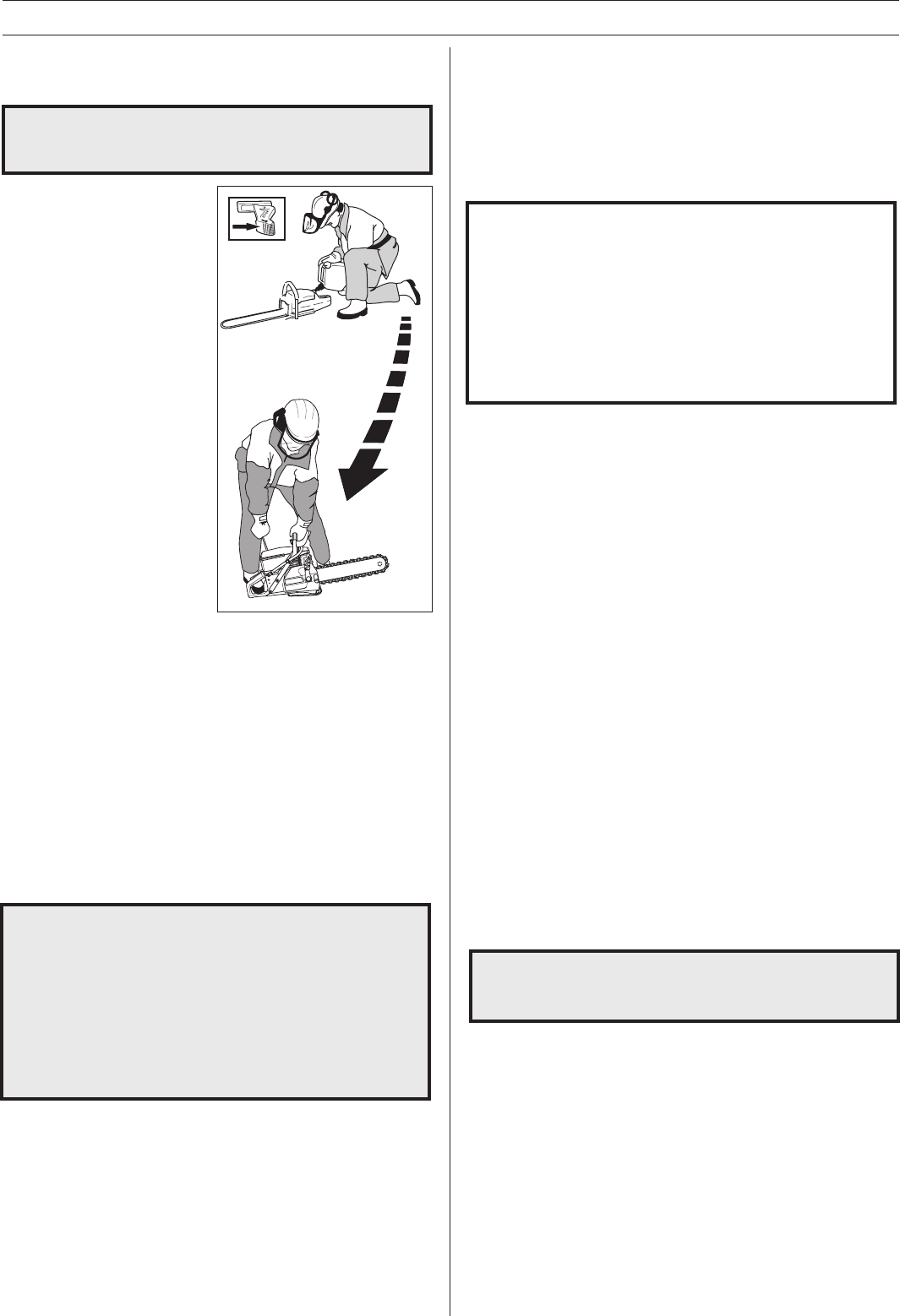
English – 7
SAFETY INSTRUCTIONS
GENERAL WORKING INSTRUCTIONS
This section takes up the basic safety precautions for working
with the cut-off saw. Follow these general working instructions,
but never use a machine without the possibility of calling for
help in the event of an accident.
Basic safety precautions
IMPORTANT INFORMATION! Never work with a cut-off
saw that is defective or incorrectly adjusted. Do not
work with a cut-off saw that is incomplete or where
assembly has not been carried out in a satisfactory
manner. Check that the cutting chain stops rotating
when the throttle is released. If you encounter a
situation where you are uncertain how to proceed you
should ask an expert.
Avoid all usage which you consider to be beyond your
capability.
• Check that no one is in the immediate vicinity when the
machine is started or while working with the machine to
ensure that people, animals or other things cannot affect your
control of the cut-off saw.
• Avoid usage in unfavourable weather conditions, for example,
thick fog, heavy rain, strong winds or extreme cold, etc. To
work in bad weather conditions is tiring and can create
dangerous circumstances, e.g. slippery surfaces.
• Never start to work with the cut-off saw before the working
area is clear and you have a firm foothold. Look out for any
obstacles with unexpected movement. Ensure when cutting
that no material can become loose and fall, causing operating
injury.Take great care when working on sloping ground.
• Make sure clothing and parts of the body do not come into
contact with the cutting chain when the engine is started.
• Maintain a safe distance from the cutting chain when the
engine is running.
• Ensure that the working area is sufficiently illuminated to
create a safe working environment.
• Check the cutting area for buried cables and wires.
• Consider the carbon monoxide risk! The diamond chain saw
emits highly dangerous carbon monoxide and as a result must
never be used in unventilated areas. Even used in deep
recesses it represents a risk if badly ventilated. Carbon
monoxide is heavier than air and collects at the bottom of
recesses.
Only use the machine in areas with good
ventilation. Neglect can result in serious
injury or death.
!
Fuel safety
(Filling/Fuel mixture/Storage)
WARNING! Exercise great care when handling
fuel. Bear in mind the risk of fire, explosions
and inhaling fumes.
• Never fill the machine while
the engine is running.
• Provide good ventilation
when filling or mixing fuel
(gasoline and 2-stroke oil).
• Move the machine at least 3
m from the filling position
before starting.
• Never start the machine:
a) If you have spilt fuel
on it. Wipe up all
spillage.
b) If you have spilt fuel
on yourself or your
clothes. Change your
clothes.
c) If there is a fuel leak.
Make regular checks for
leakage from the fuel
cap and the fuel supply
pipes.
• Store the cut-off saw and fuel so that any leakage or fumes
do not risk coming into contact with sparks or naked flames.
For example, electric machines, electric motors, electrical
switches/power switches, heaters or the like.
• When storing fuel, approved containers intended for this
purpose must be used.
• When storing the cut-off saw for long periods the fuel tank
must be emptied. Contact your local fuel station to find out
how to dispose of excess fuel.
• Use a Husqvarna fuel can with an anti-spill device.
!
!
WARNING! Use a Husqvarna fuel can with an
anti-spill device. Fuel and fuel fumes are
highly flammable. Think of the risks of fire,
explosion and breathing in fumes. Stop the
engine before refuelling. Do not overfill with
fuel. Mop up any spills on the ground or the
machine. If you spill fuel on yourself or your
clothes, change your clothes. Move the
machine at least 3 metres from the refuelling
site before starting.
Min 3 m
(10ft)


















